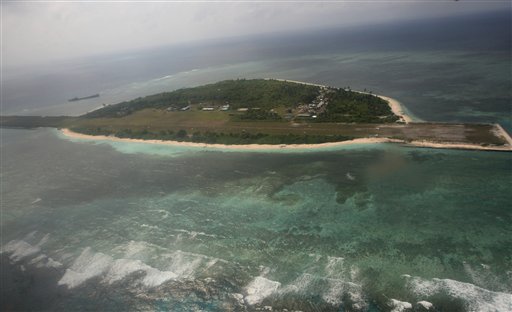China continues to claim its construction on contested islands and reefs in the South China Sea is primarily for civilian uses and will enhance its international aid efforts, even as critics say that Beijing’s humanitarian assistance is paltry and used for political retribution.
A spokesman for China’s foreign ministry said Tuesday that Beijing will soon complete its land reclamation project on islets and reefs in the Nansha Islands, also known as the Spratly Islands. Several countries in the region also claim parts of the territories in the South China Sea and accuse China of seizing the islands to bully its smaller neighbors.
U.S. officials have expressed alarm about the accelerated pace of China’s island building and its apparent attempt to militarize the territories, including with airfields and motorized artillery pieces. President Obama urged Beijing earlier this month to stop "throwing elbows" in the South China Sea, though his administration has yet to determine how it will respond to the aggressive actions.
Lu Kang, the Chinese spokesman, said the island construction is "lawful, reasonable and justified" and intended to benefit civilians.
"Apart from satisfying the need of necessary military defense, the main purpose of China's construction activities is to meet various civilian demands and better perform China's international obligations and responsibilities in the areas such as maritime search and rescue, disaster prevention and mitigation, marine scientific research, meteorological observation, ecological environment conservation, navigation safety as well as fishery production service," he said. "After the land reclamation, we will start the building of facilities to meet relevant functional requirements."
However, critics have long accused China of shirking its domestic and international duties when it comes to humanitarian assistance. According to the Global Humanitarian Assistance project run by Development Initiatives, China spent just $4 million on humanitarian assistance in 2013 despite having about $2.2 trillion in government revenues. Beijing’s humanitarian aid declined by 84 percent that year.
Countries with much smaller economies than China have contributed significantly more aid abroad. For example, Poland provided $51 million in humanitarian assistance in 2013 despite having only $209 billion in government revenues. China’s economy is almost 20 times larger than Poland’s.
While China has one of the world’s largest economies, it also has a high concentration of poor people. In 2013, China’s gross national income per capita was comparable with poverty-stricken countries such as Iraq and Cuba.
China has funneled most of its aid in recent years to African countries. Human rights groups have accused Beijing of exploiting Africa’s natural resources while not investing in the continent’s domestic energy production and importing Chinese labor for construction projects.
In 2013, China initially donated just $100,000 in humanitarian relief to the Philippines to assist typhoon victims. Beijing later agreed to send $1.4 million in supplies after widespread criticism. The meager amount of aid was likely tied to China’s territorial disputes with the Philippines, which is seeking a settlement from an international tribunal.
China did immediately dispatch a search-and-rescue team to Nepal after the earthquake there in April, but that aid was also marred by political concerns. Beijing has attempted to exert more influence in Nepal, which hosts a community of Tibetan exiles from China. Human Rights Watch reported in April 2014 that Nepal’s security forces have escalated their harassment of Tibetan refugees, including "excessive use of force, arbitrary detention, ill-treatment in detention, threats and intimidation, intrusive surveillance, and arbitrary application of vaguely formulated and overly broad definitions of security offenses."
China’s embassy in Washington did not respond to a request for comment about its island building and humanitarian assistance policies.
